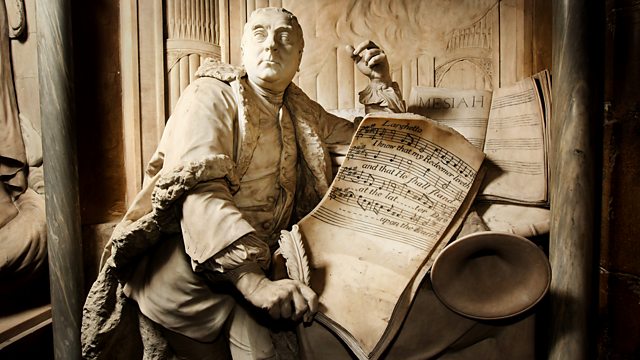
A Confection of Ideas
Donald Macleod explores Handel's beginnings, his skillful ability to impress and control his employers, and his tendency to recycle existing music.
i) A Confection of Ideas - Handel and Borrowing
Donald Macleod and Suzanne Aspden of Oxford University look at Handel's beginnings, his skillful ability to impress and control his employers, and his tendency to recycle existing music.
If you are in search of a good role model, an example of a life well spent, well navigated, look to George Frideric Handel's seventy-four years. From day one this divinely musical and decisive Saxon instinctively knew where to take himself and who to please.
Donald Macleod is joined by Suzanne Aspden, a Handel expert from Oxford University armed with the latest in Handel scholarship. Faced with hours of Handel's sublime music and the composer's eventful life story they've whisked up a focus on Handel the borrower of his own and others' music - with a look at Agrippina the opera that so impressed Venice, and an electric peformance of Dixit Dominus. They discuss Handel the politician, how the composer was adopted in England and found long-term favour with the new Hanoverian monarchy.
Some of the most arresting moments from Handel's operas Radamisto, Admeto, Partenope, and Ariodante dominate the third programme, a look at Handel the resourceful 'Opera divo'. And with ravishing music from his oratorios Esther, Saul, Samson and Messiah, Handel as 'Man of God' is also exposed, revealing the composer's ability to twist a ban on staging Biblical texts to his advantage.
Today the spirit of Handel lives on and in the final programme 'The Idea of Handel' Donald and Suzanne broadcast 'The Anthem for the Foundling Hospital', the Violin Sonata in D Op.1 and a saucy aria from Semele, as they exhibit how the reputation of this great composer has evolved over the centuries.
Last on
More episodes
Previous
You are at the first episode
Music Played
-
![]()
George Frideric Handel
Agrippina overture (1709)
Performer: English Baroque Soloists, John Eliot Gardiner (conductor)
- PHILIPS 438 0092.
-
![]()
George Frideric Handel
Il Trionfo del Tempo e del Disinganno - Urne Voi (1707)
Performer: Mark Padmore (tenor), The English Concert, Andrew Manze (director)
- HARMONIA MUNDI HMU 907422.
-
![]()
George Frideric Handel
Agrippina Act 1 Ho un non so che nel cor - Pur ritorno a rimirarvi (1709)
Performer: Donna Brown (soprano - Poppea), Della Jones (mezzo - Agrippina), Julian Clarkson (bass - Lesbo), Alistair Miles (bass - Claudio), English Baroque Soloists, John Eliot Gardiner (conductor)
- PHILIPS 438 0092.
-
![]()
George Frideric Handel
Dixit Dominus (1707)
Performer: Balthasar-Neumann Choir & Ensemble, Thomas Hengelbrock (conductor)
- DEUTSCHE HARMONIA MUNDI 82876 587922.
Broadcasts
- Mon 9 Aug 2010 12:00����ý Radio 3
- Fri 5 Nov 2010 07:00����ý Radio 3
Beethoven Unleashed – the box set
What was really wrong with Beethoven?
Composers A to Z
Who knew? Five eye-opening stories from Composer of the Week
Five reasons why we love Parry's Jerusalem
What is the strange power of Jerusalem which makes strong men weep?
A man out of time – why Parry's music and ideas were at odds with his image...
The composer of Jerusalem was very far from the conservative figure his image suggests.
Composer Help Page
Find resources and contacts for composers from within the classical music industry.





